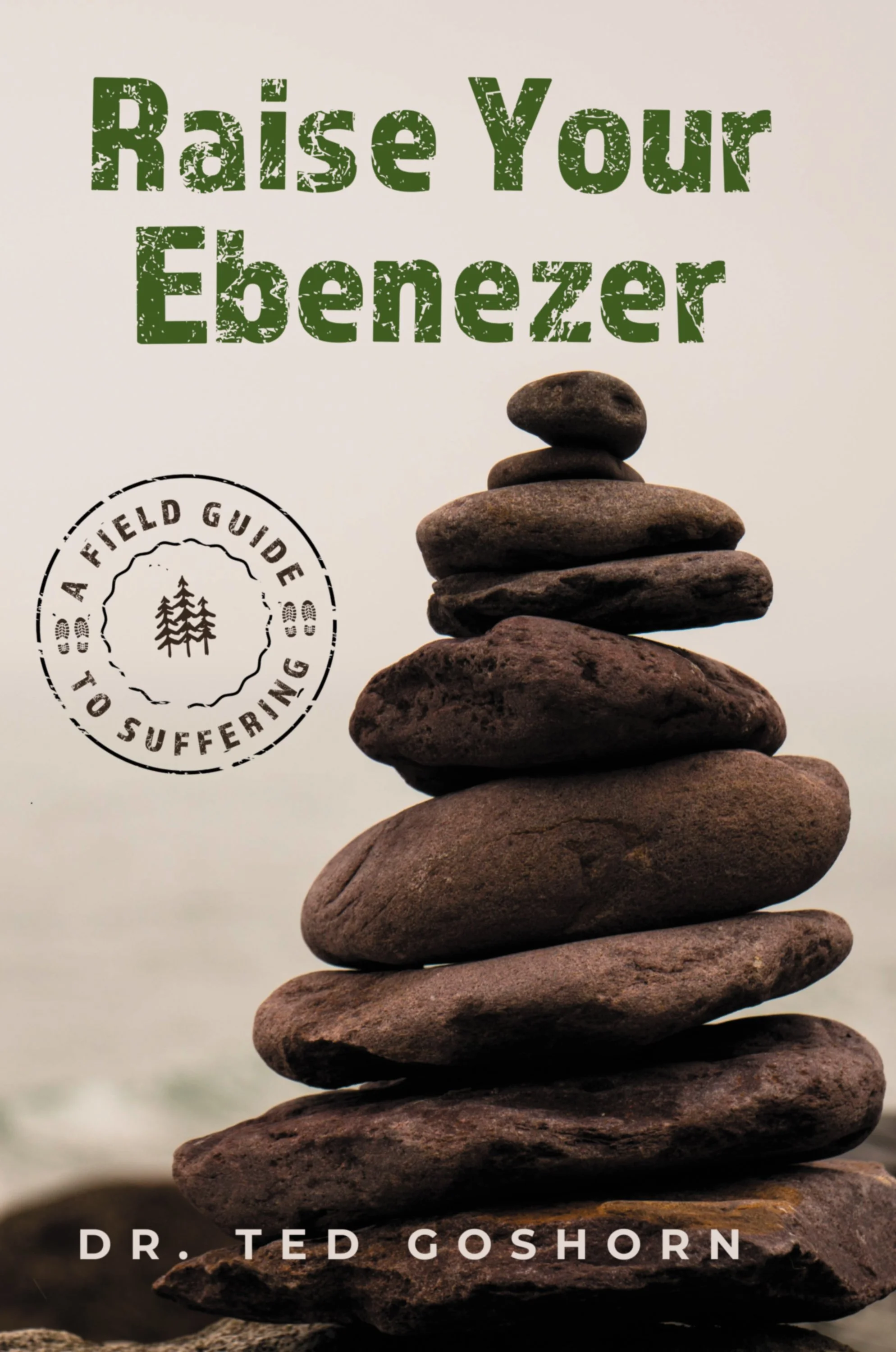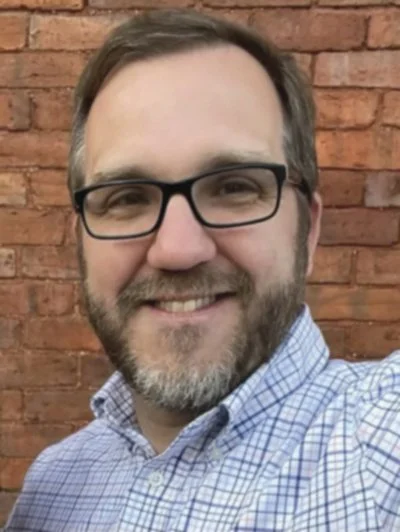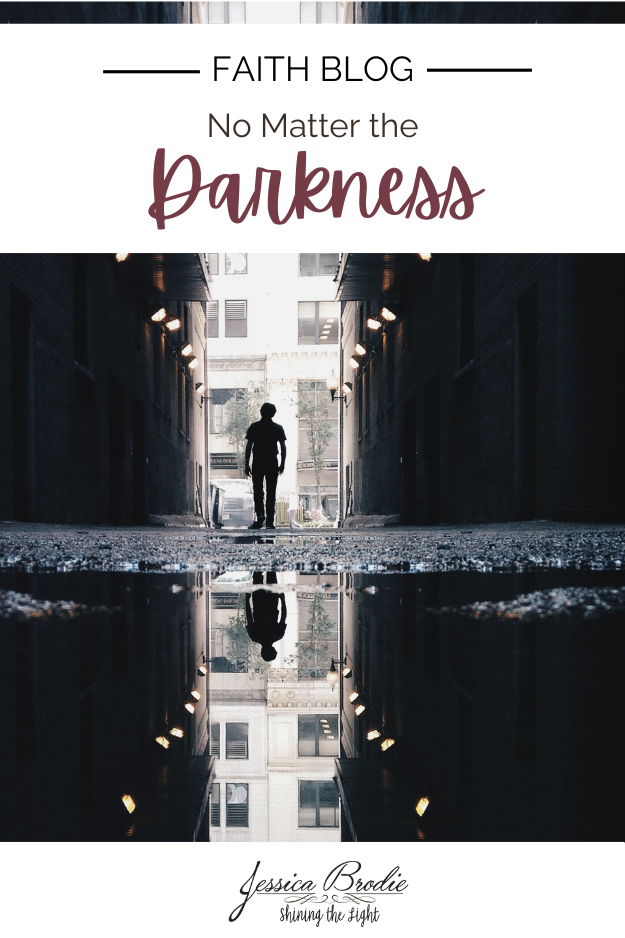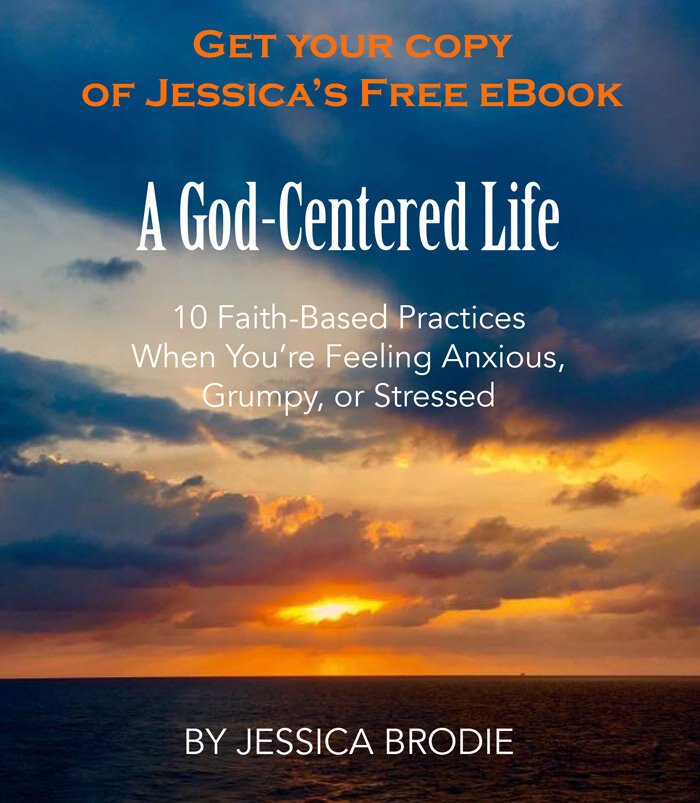Dear readers,
This week I’m excited to introduce you to the Rev. Dr. Ted Goshorn, who is a guest blogger this week. A friend and colleague of mine, Ted has just released his new perspective on suffering titled Raise Your Ebenezer: A Field Guide to Suffering, a deeply personal spiritual handbook that arose out of his own wilderness of physical, emotional, and financial despair. In Hebrew, the word ebenezer means “stone of help,” and that’s exactly what this book is meant to do—help readers craft their own unique pathway to hope in the midst of difficulty. As someone who has experienced a share of suffering, I believe this book can be a great help to anyone who is navigating the wilderness, especially right now. Ted’s book is available here, and I hope you’ll consider it.
—Jessica Brodie
A guest blog by Dr. Ted Goshorn
Darkness is often a metaphor for suffering. Perhaps there’s darkness from personal struggles, health issues, family drama, financial challenges, or friendship strife. Whatever the reason, sometimes we know darkness more than light during seasons of life.
A season of darkness characterized one particular Advent in my life. I came to church with longings for peace, for release, for hope, and most of all, for a longing to come out of the fog of darkness and back into the light.
Such is the stuff of Advent. During this holy season, we long for things, awaiting the arrival of Christ into the world, into our suffering, into our darkness. The days of Advent grow shorter, the nights longer, enveloping us. It can feel total at times, just the way our suffering can consume us. But, there is no light without darkness. As with a single candle lit in a dark room, the darkness reveals the light.
Phillips Brooks knew just this reality. One night many years ago, he sat on horseback atop a hillside. As Christmas Eve approached, this Episcopal priest journeyed out of Jerusalem toward Bethlehem, asking along the way where shepherds were keeping their flock by night.
So it was that on Christmas Eve 1868, Brooks climbed the hill at night, looking at a starlit sky. And just off in the distance, the city of Bethlehem sat still, quiet, and dark.
The moment captured Brooks’s imagination. He felt overcome by that rush of feeling we often attribute to the Holy Spirit. Brooks felt as though he was looking back in time, seeing things as they might have been for the shepherds.
When he got home to Boston, wanting to record his feelings, Brooks wrote a poem, “O Little Town of Bethlehem.” He began, “O little town of Bethlehem, how still we see thee lie. Above thy deep and dreamless sleep, the silent stars go by.”
Brooks had experienced profound peace, profound silence, and the brilliance of a night sky unencumbered by artificial light. And so his poem continues: “Yet in thy dark streets shineth the everlasting light.”
In his powerful spiritual moment on that hillside looking at Bethlehem, Phillips Brooks knew this fundamental truth of our faith: No matter the darkness, the light shines.
The time of the writing of the gospel of John was also a dark time. This is the newest of the gospels, and, by that time, Christian persecution had picked up tremendously. Christians longed for release from that persecution. They all knew someone who’d been jailed or executed or killed for sport in a stadium somewhere, and they longed to be released from it. Longing characterized the Christian people at this moment in history.
John speaks into those longings by presenting Jesus as the light of the world: a light that the darkness cannot overcome (John 1:1-5). The darkness is all around these early Christians through persecution. And yet, they hear John say that the darkness did not overcome the light. His gospel is a word of encouragement to these persecuted Christians: No matter the darkness you know, no matter how much evil might seem to be winning, the light still shines.
For John knew what Phillips Brooks discovered: “Yet in thy dark streets shineth the everlasting light.” No matter the darkness, the light shines.
Standing in church during my dark Advent season, I heard a new Christmas carol, “I Want to Walk as a Child of the Light,” by Kathleen Thomerson. The chorus says, “In him there is no darkness at all. The night and the day are both alike. The lamb is the light of the city of God; shine in my heart, Lord Jesus.”
I needed the light so much that season. Before that church service, I heard “the Christmas angels, their great glad tidings tell,” as Phillips Brooks so poignantly wrote in “O Little Town,” but their carols failed to resonate within me. The darkness was too great.
And then, this carol about light cut through the darkness and opened up my soul to see the light—to know that the light of Christ was still around me, still within me. In that hymn, I felt reassured that the light shines in the darkness and the darkness did not overcome it.
Later that season, I heard “O Little Town” again but picked up on that line as never before: “Yet in thy dark streets shineth the everlasting light.” And I knew, I just knew, that in my dark streets, the everlasting light shone.
When we journey through the land of suffering, or perhaps simply during this Advent season, we must allow ourselves to long for the light. Give voice to your longings. Don’t tune out the angels with their great glad tidings. Don’t shut yourself off from others.
Instead, embrace your longings. For when we do, we open our souls up to receive the light of Christ. When we embrace our longings, when we learn to long for the light, we give God space to shine in our hearts, showing us that in Christ “there is no darkness at all, the night and the day are both alike,” that no matter the darkness, the light shines.
On a hillside similar to where Phillips Brooks sat that night in 1868, angels centuries before gave voice to the longings of the people of God as they told their great glad tidings to the shepherds keeping watch over their flock by night. And their tidings, their voice, showed the way to the light, for the shepherds and for the people of God forevermore, for the darkness reveals the light.
What are you longing for? Where do you know darkness? Give voice to those longings and you will find the light. “Yet in thy dark streets shineth the everlasting light. The hopes and fears of all the years are met in thee tonight.” No matter the darkness, the light shines.
The author of Raise Your Ebenezer: A Field Guide to Suffering, Dr. Ted Goshorn lives, moves, and has his being in the mountains of Western North Carolina. There, with his wife, Dana, his sons Jackson and Carter, and his dog, Quill, they have found a deep sense of home after wandering through the land of suffering. Ted will soon serve as a financial advisor, working with individuals and communities to faithfully steward the resources entrusted to them. Ordained in The United Methodist Church, Ted holds a Doctor of Ministry from the Candler School of Theology at Emory University, along with various other degrees from Emory, James Madison University, and Berry College. He has inspired collaborations across religious, nonprofit, and government agencies; led efforts to pay off more than $1 million in medical debt; and fostered children and youth support programs. For his effort with at-risk youth, the Emory University Alumni Association recognized Ted as one of its 40 Under Forty in 2021. Ted wrote this book while in the land of suffering and prays it gives you hope as you seek God on your journey. Connect with Ted further at https://tedgoshorn.org/
If you know someone who would benefit from reading this blog, please share this with them:
Thanks to my Patreon sponsors: Matt Brodie, Emily Dodd, Kathleen Patella, Billy Robinson, Yancy Rose, and Lanny Turner.
SHARE TODAY’S BLOG ON SOCIAL MEDIA: CLICK HERE OR THE SOCIAL LINKS BELOW.






